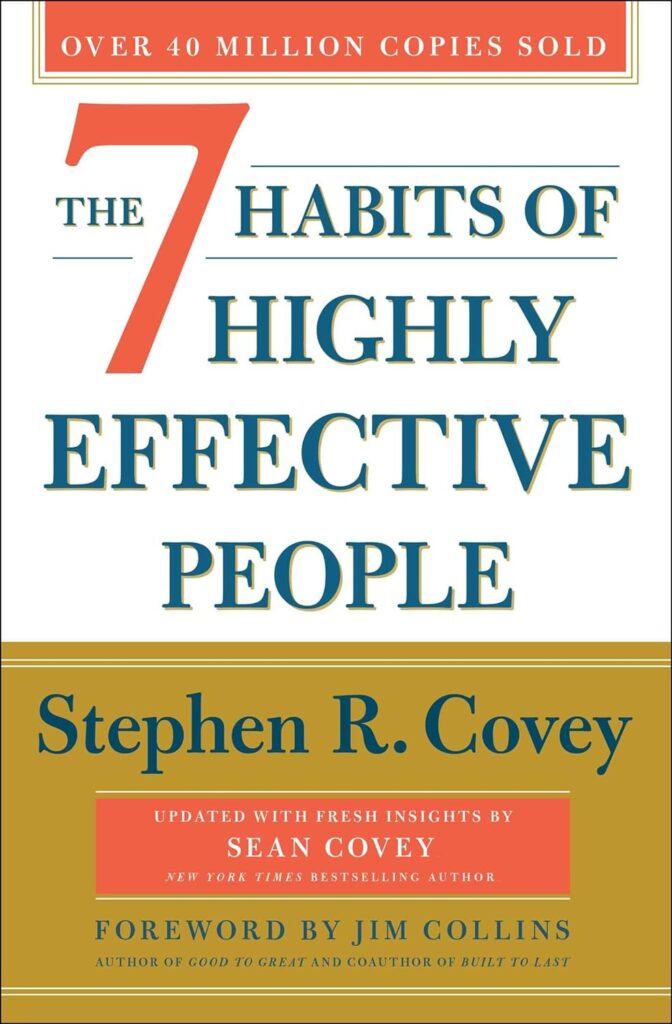Let me tell you a little secret: the first time I heard about The 7 Habits of Highly Effective People by Stephen Covey, I wasn’t exactly thrilled. I thought it was just another self-help book with a bunch of clichés. But I couldn’t have been more wrong. This book didn’t just give me tips on how to be more productive; it changed the way I see the world and how I live my life. If you’re curious about what makes this book so powerful, let’s dive in together and explore these seven habits that have the potential to transform your life.

1. Be Proactive: You Are the Architect of Your Life
The first habit Covey talks about is being proactive, and let me tell you, it’s a game-changer. You know how sometimes life throws curveballs at you, and it feels like you’re just reacting to whatever comes your way? Well, Covey flips that script. He encourages us to take the reins and be the creators of our destiny.
Being proactive means recognizing that you have control over your actions and responses. It’s about taking responsibility for your life, instead of blaming circumstances or other people. This was a wake-up call for me. I used to think, “Well, if only this or that hadn’t happened, I’d be in a better place.” But the truth is, we can’t control everything that happens to us, but we can control how we respond. Covey says it’s all about focusing on your circle of influence—the things you can actually change—rather than stressing over what’s out of your control.
This habit alone can make a world of difference. Imagine starting your day with the mindset that you’re in control, that you have the power to shape your future. It’s empowering, isn’t it? And trust me, once you start living proactively, you’ll wonder how you ever lived any other way.
2. Begin With the End in Mind: Visualize Your Future
Have you ever started a project without a clear idea of where you wanted to end up? I know I have, and more often than not, it led to frustration and confusion. Covey’s second habit, Begin with the End in Mind, is all about knowing where you’re going before you even start.
This habit is like creating a blueprint for your life. It’s about setting clear goals and envisioning the kind of person you want to become. Covey suggests that you imagine your own funeral—what do you want people to say about you? What legacy do you want to leave behind? It’s a bit morbid, I know, but it’s a powerful way to get you thinking about what really matters in life.
For me, this habit was a wake-up call. It made me realize that I was just drifting, doing things without any real sense of purpose. But once I started to think about the kind of life I wanted to create, everything changed. My decisions became more intentional, and I found myself more focused and motivated. It’s amazing how much clarity you gain when you have a clear picture of your destination.
3. Put First Things First: Prioritize What Truly Matters
Let’s be honest—life is busy. There are always a million things vying for our attention, and it’s easy to get caught up in the whirlwind of daily tasks. Covey’s third habit, Put First Things First, is all about prioritizing what truly matters and not getting lost in the noise.
This habit is like having a compass that keeps you on the right path. Covey introduces the concept of “big rocks” and “small rocks.” The big rocks are your most important tasks and commitments—the things that align with your long-term goals and values. The small rocks are the less important, more trivial things that can easily fill up your time if you’re not careful.
I used to be a master at juggling small rocks, thinking I was being productive by ticking off items on my to-do list. But then I’d wonder why I still felt stressed and unfulfilled. Covey’s approach taught me to focus on the big rocks first. Once I started prioritizing the things that truly mattered—whether it was spending quality time with loved ones or working on a passion project—I noticed a shift. Life felt more balanced, more meaningful. It’s like clearing away the clutter so you can focus on what’s really important.
4. Think Win-Win: Cultivate a Mindset of Abundance
Now, let’s talk about relationships—whether in business, friendship, or family. Covey’s fourth habit, Think Win-Win, is all about adopting a mindset of abundance rather than scarcity. It’s about seeking solutions where everyone benefits, rather than thinking that for one person to win, another has to lose.
In a world that often feels competitive and cutthroat, this habit was a breath of fresh air for me. Covey challenges us to approach interactions with a spirit of cooperation, where the goal is mutual benefit. It’s not about compromising your values or giving in; it’s about finding a solution that respects and satisfies both parties.
When I started applying this habit in my own life, I noticed something interesting. Conversations became more open, and conflicts were resolved more smoothly. It was like a weight had been lifted, and relationships became more genuine and fulfilling. Thinking win-win isn’t just good for business; it’s good for the soul.
5. Seek First to Understand, Then to Be Understood: Listen With Empathy
This habit hit home for me in a big way. Seek First to Understand, Then to Be Understood is all about listening—really listening—with the intent to understand, rather than just waiting for your turn to speak. It sounds simple, but it’s harder than it seems.
How often do we rush to give advice or share our own experiences without fully listening to the other person? I know I’ve been guilty of this more times than I’d like to admit. But Covey emphasizes that true communication starts with empathy. It’s about putting yourself in the other person’s shoes and really trying to understand their perspective.
When I started practicing this habit, I noticed a profound change in my relationships. People responded more positively, and I felt more connected to those around me. It’s like opening a door to deeper, more meaningful conversations. And here’s the kicker—when you truly understand someone else, they’re more likely to listen to you in return. It’s a win-win in the truest sense.
6. Synergize: The Power of Collaboration
Covey’s sixth habit, Synergize, is about the magic that happens when people work together. Synergy is more than just teamwork; it’s about creating something greater than the sum of its parts. It’s the idea that when we combine our strengths, we can achieve extraordinary results.
I used to think I had to do everything on my own to get it done right. But Covey’s concept of synergy taught me that collaboration often leads to better outcomes than I could achieve by myself. It’s about embracing diversity—different perspectives, ideas, and talents—and using them to create innovative solutions.
In my own life, I’ve seen the power of synergy in action. Whether it’s working on a project at work or planning a family event, when everyone brings their unique strengths to the table, the results are always more creative and impactful. Synergy isn’t just a buzzword; it’s a powerful principle that can transform the way we work and live.
7. Sharpen the Saw: Renew Yourself Regularly
The final habit, Sharpen the Saw, is about self-renewal. Covey uses the analogy of a woodcutter who, in his eagerness to chop down trees, forgets to sharpen his saw. Eventually, his tool becomes dull, and the work gets harder and harder.
This habit is a reminder to take care of yourself—physically, mentally, emotionally, and spiritually. It’s about making time for rest, reflection, and growth. In our fast-paced world, it’s easy to neglect self-care, but Covey emphasizes that if we don’t take time to renew ourselves, we’ll burn out.
I used to feel guilty about taking time for myself, thinking it was selfish or unproductive. But Covey’s words helped me see that self-renewal isn’t just important—it’s essential. Whether it’s reading a good book, going for a walk, meditating, or spending time with loved ones, sharpening the saw allows you to come back stronger and more effective.
Conclusion: Which Habit Will You Start With?
So there you have it—The 7 Habits of Highly Effective People distilled into a personal journey of growth and discovery. These habits aren’t just theories; they’re practical principles that can truly change your life if you apply them. But here’s the big question: which habit will you start with? Will you focus on being proactive, or maybe on improving your relationships through better listening? The choice is yours, and the possibilities are endless. What will your first step be on the path to becoming a highly effective person?




